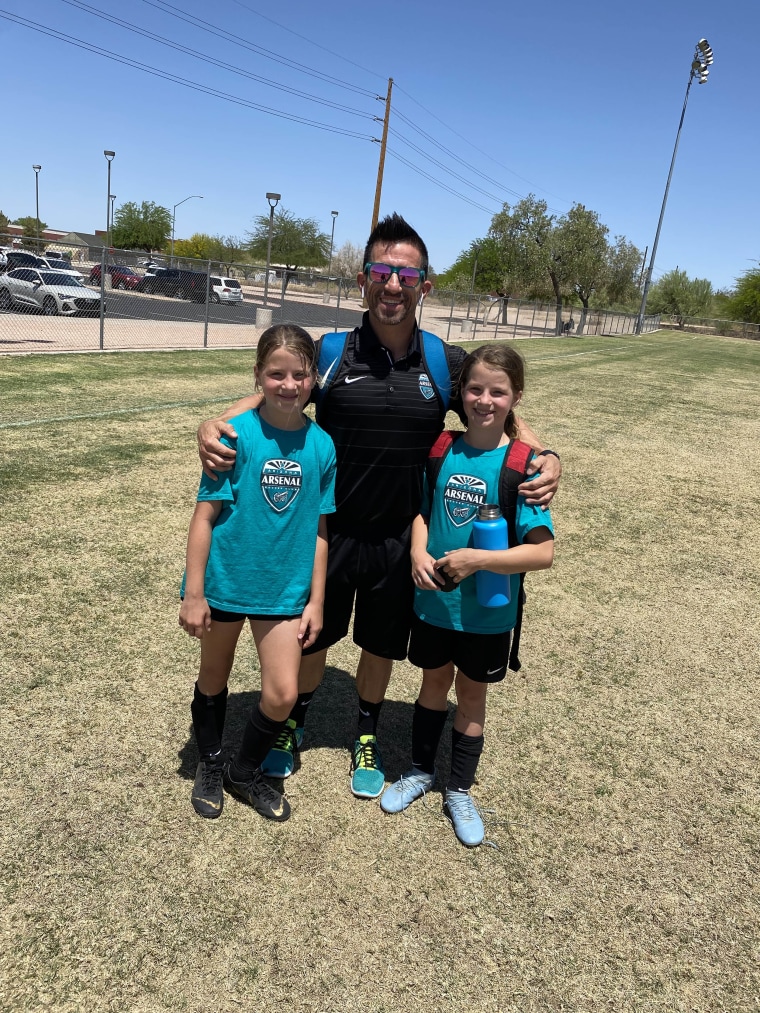When Matt Midkiff received a call from daughter Emeri, 12, that her twin, Pyper, had collapsed during soccer practice, he worried that Pyper hit her head. Midkiff was coaching at a nearby field and rushed over to see what happened.
“When I got over there, the coaching director was panicking. … Kids were off to the side crying,” Midkiff, 49, of Phoenix, tells TODAY.com. “I saw two adults over this kid and ran over to see it was Pyper on the ground, and she started turning blue.”

Pyper experienced cardiac arrest and was rushed to the hospital, where doctors worked to stabilize her and figure out why she crashed.
“It’s been a horrible roller coaster ride, but every day has been a little better than it was the day before,” Midkiff says. “I just pray that it continues.”
Soccer practice ends in an emergency
For the past six years, Pyper has played soccer. When she, her sister and dad arrived at the field on April 27, it seemed like any other practice. About 20 minutes in, Midkiff, who coaches the under 14 group, received a call from Emeri. When he arrived, Midkiff started shouting, panicked.
“I was just yelling at my daughter to keep fighting, telling (the woman) not to stop CPR, yelling at people (about) where the ambulance was,” Midkiff recalls. “My pulse was pretty high at the time, so it’s not the easiest thing under those circumstances, and Pyper’s breath was really really shallow.”
The ambulance arrived and the paramedics assessed her condition. Pyper was in atrial fibrillation, when the heart beats at an abnormal rate, and the paramedics used an automated external defibrillator to shock it back into rhythm. She went to Phoenix Children’s Hospital, where doctors intubated her, she underwent an EKG and had neurocognitive screening.
“She was not responsive to the doctors,” Midkiff says. But “I felt like twice she grabbed (my finger) when I asked her.”
Doctors recommended cooling Pyper’s body to prevent more damage to her heart and brain, part of a multicenter clinical trial examining cooling in pediatric cardiac arrest patients. The family agreed.
“I’m a physical therapist, so I understand medicine pretty well, and I know that’s been used on elite athletes like (Damar) Hamlin, from the Bills,” Midkiff says. “It’s something that I was very comfortable saying yes to.”
He says doctor chilled her for four hours and then warmed her up to lower than body temperature. On May 1, Pyper started waking.
“She’s still in and out,” her father says. “She’s able to answer a couple of commands. She was crying freaked out, didn’t know where she was at.”
But Pyper easily told doctors what soccer position she plays, center midfield, and what positions she wasn’t good at, center back and center forward, which Midkiff says “is true.”
“Her heart is a worry and a concern and will continue to be a concern. But the biggest worry is how much time did her brain not have oxygen,” he says. “What’s going to be the cognitive impairment? Is there going to be one? How bad is it going to be?”
Doctors performed a variety of tests to understand why Pyper went into cardiac arrest, and they found she had an underlying genetic condition called hypertrophic cardiomyopathy. Emeri also has it, the family learned.
“It’s not going to go away. It’s managed with medication, exercise modification,” Midkiff says. “They will put an (implantable) defibrillator in Pyper’s heart. Her sister, at this point, doesn’t need that. But it’ll be something we monitor.”
Cardiac arrest and hypertrophic cardiomyopathy
Children don’t often experience cardiac arrest.
“It’s not common, fortunately,” Dr. Wayne Franklin, division chief of cardiology and co-director of the Phoenix Children’s Center for Heart Care, tells TODAY.com. “When it does happen … the most important thing is to get adequate CPR and then defibrillated.”
Franklin says the bystanders reacting to Pyper’s collapse did all the right things, including first calling 911 then performing high quality CPR with strong chest compression with AED shocks.
“The circulation is the important part,” Franklin says. “I’m a big proponent of having AEDs, or automatic external defibrillators, at schools and gyms and sporting events.”
These actions likely improved Pyper’s outcome.
“The CPR was very timely, very quick and effective,” he says. “She’s doing pretty well. She got off her ventilator two days ago, so she’s breathing on her own. ... She’s following simple commands, and I was fortunate enough to be able to see her hug her mom today.”
The condition Pyper has, hypertrophic cardiomyopathy, causes a "thickened heart muscle," Franklin says.
“It’s actually the most common cause of sudden death in children greater than 1,” he adds. “The heart muscle is very thick, and the heart muscle fibers are in disarray.”
If the heart is thick when it contracts, the outflow of blood to the body can become blocked.
“That can lead to a lethal arrhythmia, which is probably what happened in Pyper’s case,” Franklin says. “Her heart was beating very fast, and she probably had some blockage of blood flow.”
Doctors normally diagnose it with an echocardiogram of the heart. Some children have no symptoms, while others have a slight heart murmur or a small abnormality on an EKG.
“Sometimes it goes unrecognized, and sometimes the first sign is sudden death, which is obviously quite dramatic,” Franklin says.
Doctors are unsure why it occurs, though they do know it has a genetic component. It can be treated with some medication and exercise restriction. In some cases, doctors perform a procedure that reduces the thickness of the muscle.
“Most of the time these patients are restricted from organized sports, such as soccer and basketball,” Franklin says.
He says he hopes people learn CPR and communities invest in placing AEDs at schools, gyms and parks.
“They can save lives,” Franklin says. “There’s some kids that are going to go undiagnosed, but we can clearly treat them and prevent them from dying with AEDs.”

‘Big personality’
It’s still too soon for doctors to know the extent of the damage Pyper sustained, but she seems to be improving steadily. She recently stood and can sit in a chair, which her dad calls “miraculous.” She has physical therapy ahead of her, and she’ll need to be in the pediatric intensive care unit after she receives her defibrillator. Her personality, which garnered her the nickname “spicy Pypie,” has reemerged, quipping to her older sister, Landri, the other day that “she’s only 14 and isn’t her mother.”
“She’s got a big personality, a lot of positive attitude. She loves her friendships, as well as soccer,” Midkiff says. “She loves hanging out, going to bounce houses, playing Roblox and, like any kid, doing TikTok videos.”
The Midkiffs knows Pyper has a long recovery ahead and are taking each day as it comes.
“It’ll be walking over one hurdle at a time from literally getting out of bed and walking, to getting her stamina back, to getting her defibrillator in and then recovering from that, trying to get her back to her normal healthy self,” her dad says.
A friend set up a GoFundMe, Prayers for Pyper, to help the family. Midkiff hopes Pyper’s story encourages others to learn about the importance of bystander intervention in cardiac arrest.
“Everyone should be CPR certified,” he says. “Because without that, I doubt she would be alive.”